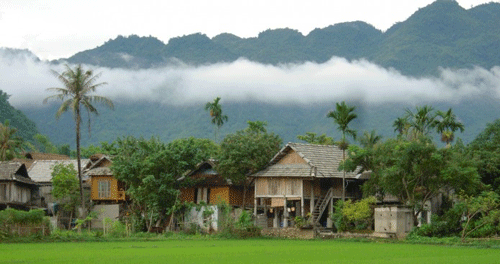Travel to Vietnam, exploring the captivating beauty and rich cultural tapestry of this country, blessed by the warmth of its people. To enhance your travel experience and avoid cultural missteps, it is crucial to acquaint yourself with a few rules about dos and don’ts in Vietnam.
We share with you 20 valuable tips and recommendations on the dos and don’ts in Vietnam, ensuring you navigate with confidence and ease through Vietnam’s customs and etiquette.
10 Dos During Your Trip to Vietnam
1. Wear modest attire when visiting sacred places in Vietnam
This practice reflects deep respect for the local culture and traditions, minimizing the risk of causing offense or discomfort to the community while allowing for a deeper connection with the spiritual essence of sites such as temples and pagodas.
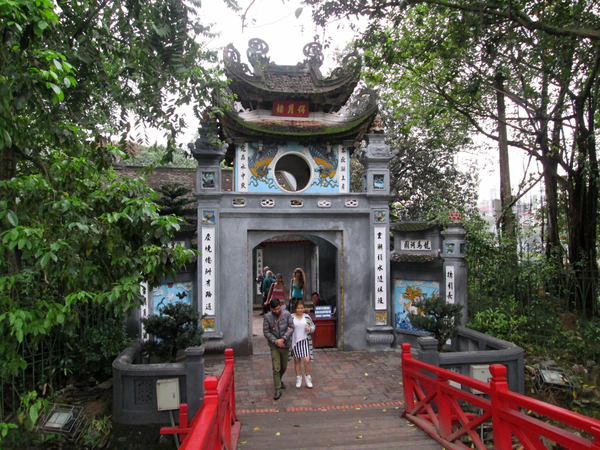
Ngoc Son Temple – Hanoi, Vietnam
2. Remove your shoes when entering a house or a temple
This gesture not only symbolizes reverence but also helps maintain cleanliness, especially in households where people use the floor for sitting and sleeping. Following this tradition helps avoid cultural misunderstandings and demonstrates appreciation and compliance with local standards. Shoes should also be removed when entering the various areas of temples and pagodas.
3. Adopt a respectful attitude towards locals and their customs
During a tour in Vietnam, international visitors often discover the friendly and welcoming nature of the Vietnamese people. By reciprocating with respect for their culture and traditions, travelers can foster positive and pleasant interactions with the locals.
4. Use small denominations of Vietnamese dong for transactions
This practice proves beneficial when dealing with various vendors, stores, and small street stalls. Having smaller denomination bills ensures a smooth shopping experience during your exploration of Vietnam.
This culinary adventure is a must, offering a unique exploration of the local culture at an affordable price.
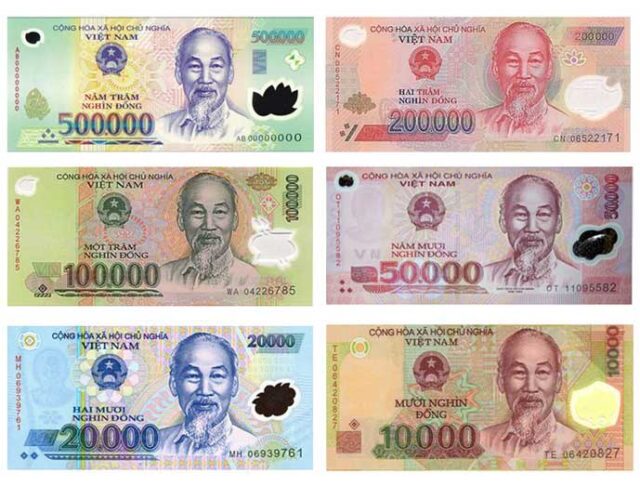
Money in Vietnam
5. Enjoy affordable street food in Vietnam
This culinary adventure is a must, offering a unique exploration of local culture through bold flavors, diverse regional variations, and the freshness associated with Vietnam’s street food.
6. Visit local markets for an immersion into vibrant culture
Vietnam’s markets provide an opportunity to taste delicious street specialties, discover distinctive souvenirs, and interact with friendly locals in the lively market atmosphere.
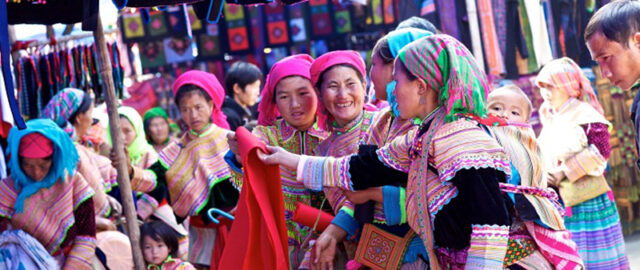
Bac Ha – A typical traditional ethnic market
7. Bargain when shopping at Vietnam’s markets
Skillful negotiation is an integral part of the shopping experience in Vietnam, allowing visitors to interact with local sellers while bargaining for various goods. The key to successful bargaining lies in maintaining a friendly and respectful attitude to secure the best deal possible for souvenirs and other items.
8. Expect bustling traffic, especially in major cities
Stay aware of your surroundings, follow traffic rules, and exercise caution while walking, particularly in cities like Hanoi, Ho Chi Minh City, and Da Nang, etc. Consider avoiding rush hours and use ride-sharing services like Grab for smoother city navigation.
9. Protect yourself from tropical sun with sunscreen and a hat
These simple measures are essential to shield yourself from sunburns and heatstrokes, ensuring a comfortable exploration of Vietnam’s diverse landscapes.
10. Learn a few basic phrases in Vietnamese to show respect for local culture
Even a simple “xin chào” (hello) or “cảm ơn” (thank you) in Vietnamese can significantly enhance your communication and foster positive connections with the Vietnamese people you encounter during your journey.
10 Don’ts During Your Trip to Vietnam
1. Avoid revealing clothing and inappropriate behavior in temples
Modesty is crucial, especially when visiting religious sites. Dress appropriately by covering your shoulders and knees as a sign of respect for cultural norms. Do not touch offerings on altars in temples and houses, as they are meant for the deceased.
2. Don’t raise your voice in public
Expressing emotions, especially anger, openly is considered inappropriate. Resolving issues calmly and privately is seen as more respectful to prevent misunderstandings and conflicts.
3. Show restraint in public displays of affection
Intimate physical contact, such as kissing or hugging, should be avoided in public spaces, particularly in conservative areas. Holding hands is generally acceptable, but follow the locals’ example.
4. Don’t disrespect the national flag and leaders
Any disrespect towards national symbols or political figures is a serious offense, so foreign visitors should be mindful of their behavior.
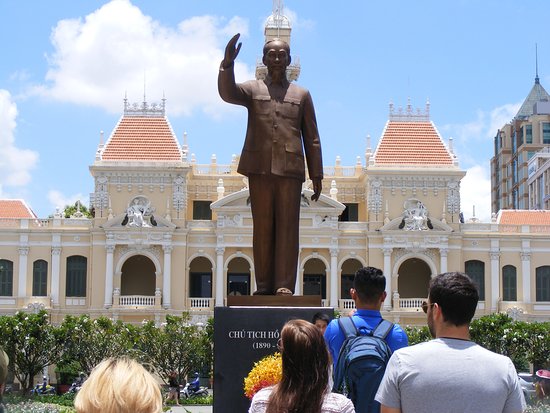
Statue of President Ho Chi Minh – HCMC
5. Avoid touching the head without permission
The head is considered the most sacred part of the body in Vietnamese culture, and unauthorized contact is seen as disrespectful.
6. Do not use your feet to point
Gestures with the feet are offensive as they are considered the lowest part of the body. Use hand gestures to convey messages respectfully.
7. Don’t take soneone’s photos before seeking permission
Asking for permission before taking photographs, especially in situations where a small fee may be requested, is a courteous gesture respecting privacy and cultural sensitivities.
8. Avoid tap water; opt for bottled water
To prevent potential health risks, especially in rural areas, choose bottled water from reputable brands like “La Vie” or “Aquafina.”
9. Do not litter
Proper waste disposal is essential to contribute to environmental preservation, as Vietnam faces waste management challenges.
10. Avoid sensitive topics like war or politics
To prevent awkward situations, refrain from discussing emotionally charged topics such as war or politics during conversations with locals. Instead, focus on exploring Vietnam’s rich cultural heritage, natural beauty, and culinary delights.
By adhering to these guidelines on the dos and don’ts of Vietnam, travelers can foster positive and meaningful connections with the local community, ensuring a pleasant journey in Vietnam. Have a nice trip!










